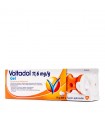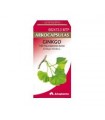CONTRAINDICATIONS
- Hypersensitivity to any component of the medicine.- Severe renal failure (CLcr < 30 ml/min). - [HIPERCALCEMIA] o condiciones que provocan hipercalcemia- Antecedentes de [HIPOFOSFATEMIA]- Nefrolitiasis debida a [CALCULOS RENALES] de calcio.
PREGNANCY
An open, controlled study in 281 pregnant women showed no significant adverse effects of Gaviscon in the course of pregnancy or in the health of the newborn fetus/child. Based on this and previous experience, this medicine can be used during pregnancy. However, taking into account the presence of calcium carbonate it is recommended to limit the duration of treatment to the maximum and avoid concomitant intake of milk and dairy products to prevent excess calcium that can trigger milk-alkaline syndrome.
INDICATIONS
- Symptomatic treatment of [HIPERACIDEZ GASTRICA] and burning caused by acid reflux of the stomach.
INTERACTIONS
- Digital (digoxin, digitoxine): there are studies with some antacids (algelrate, magnesium hydroxide) in which decreased digitic absorption has been reported, so it is recommended to space their administration 2 or 3 h.- Erlotinib: possible reduction of erlotinib levels, by reducing their absorption. Antacids increase gastric pH, which could decrease the solubility of erlotinib, its absorption and its therapeutic effects. It is recommended to administer at least 4 hours before or 2 h after the daily dose of antineoplastic.- Gabapentin: some decrease in gabapentin levels has been observed when administered together or within 2 hours after taking other antacids, by increasing pH. It is recommended to administer gabapentin 2 h before an antacid.- Quinolone (ciprofloxacin, norfloxacin): there are studies with some antacids (algeldrate, almagato) in which it has been reported to decrease their absorption by formation of insoluble complexes not absorbable at the intestinal level, so it is recommended to separate their administration 2 or 3 h.- Iron salts (citrate, fumarate, iron sulfate): there are studies with some antacids (algeldrate, magnesium trisylate) in which decreased absorption by formation of low soluble complexes has been reported, so it is recommended to space administration 2 or 3 h.- Lithium salts (lithium carbonate): there are studies in which there has been a possible increase in its renal excretion with loss of anti-manic activity, because some of the sodium can be reabsorbed instead of lithium.- Tetracyclines (tetracycline): there are studies in which possible formation of non-absorbable complexes at the gastrointestinal level has been reported, thus decreasing their absorption, so it is recommended to space out administration 2 or 3 h.
BREAST FEEDING
Use accepted. Not recommended for chronic or excessive use.
RULES FOR PROPER ADMINISTRATION
- Oral administration, preferably after meals and before bedtime.
- It should not be taken with large amounts of milk or dairy products as (due to its calcium antacid content) it can lead to increased blood calcium levels and milk and alkaline syndrome (Burnett syndrome).
- Distance the administration of this medicine and any other drugs.
DOSAGE
- Adults and over 12 years (normal and forte), oral: 2-4 chewable tablets or 1-2 envelopes, as needed, up to 4 times a day; 16 tablets/day or 8 envelopes/day.- Children < 12 años: no se recomienda, salvo mejor criterio médico.As with all antacids, if symptoms persist for more than 7 days despite ongoing treatment, the clinical situation should be evaluated.
PRECAUTIONS
- [RENAL CALCULATIONS]. Avoid prolonged use because it increases the risk of developing kidney stones.- [HYPERCALCEMIA]. High-dose administration over long periods of time may produce undesirable effects such as hypercalcemia and alkaline milk syndrome, especially in patients with renal impairment. The medicine should not be administered with large amounts of milk or lactic products.- [HYPERCALCIURIA]. It should not be administered in these patients.- [RENAL INSUFFICIENCY]. Administration is not recommended in patients with severe renal impairment (ClCr <30 ml/min).="" si="" se="" administra="" de="" forma="" prolongada="" en="" clcr="">/ 30 ml/min, plasma levels of calcium, phosphate and magnesium should be monitored regularly.- In general, calcium-containing antacids should not be given to patients with [STRESS], [HEMORROIDES] and [SARCOIDOSIS], unless better medically.- Patients with very low levels of gastric acid. There is a possibility of reduced efficacy in these patients.- Isolated cases of a possible relationship between calcium carbonate, [APENDICITIS], [GASTROINTESTINAL HEMORRAGIA], [INTESTINAL OBSTRUCTION], or [EDEMA] have been described in the literature.
PRECAUTIONS RELATING TO EXCIPIENTS
- This medicine contains aspartame as an excipient, so it should be taken into account by those affected by [FENILCETONURIA]. 100 mg aspartame corresponds to 56.13 mg phenylalanine.
ADVERSE REACTIONS
- Exceptionally, allergic reactions such as [URTICARIA] or [BRONQUIAL SPASM] and [ANAFILAXIA] have been observed.- It has also been reported that disorders of metabolism and nutrition such as [HIPERCALCEMIA] and [ALCALOSIS] as well as Burnett syndrome (milk-alkaline syndrome) can occur due to prolonged use and high doses.




























